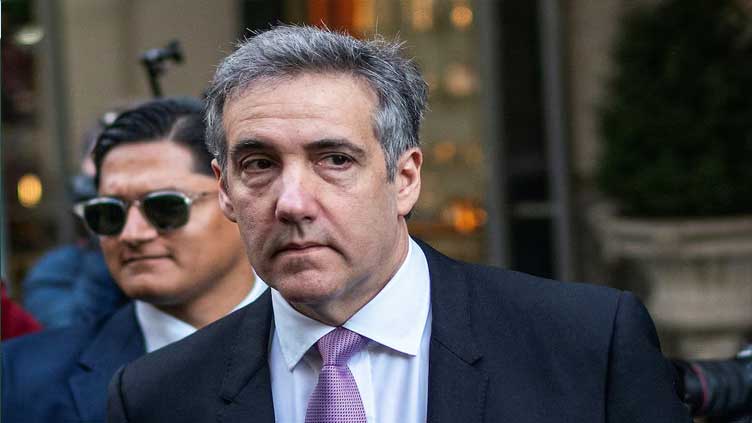Cohen testifies stealing from Trump was 'self-help' at hush money trial

World
Cohen testifies stealing from Trump was 'self-help' at hush money trial
NEW YORK (Reuters) - Donald Trump's former fixer Michael Cohen testified on Monday that he stole money from Trump's company as a form of "self-help," an admission that could chip away at his credibility as a star witness at the former US president's hush money trial.
Questioned by Trump's lawyer Todd Blanche, Cohen acknowledged stealing from the Trump Organization by including a reimbursement to a technology company in his bonus package and pocketing most of the money.
"So you stole from the Trump Organization, right?" Blanche asked.
"Yes sir," Cohen, 57, testified.
Cohen said he paid roughly $20,000 of the $50,000 that Trump's company owed to the tech company in cash, handing it off in a brown paper bag at his office. He said he kept the rest. He was reimbursed $100,000 total by the Trump Organization for that payment.
Under questioning by prosecutors a bit later, Cohen testified he stole the money because he was upset about his annual bonus being cut after he fronted $130,000 of his own money to buy the silence of porn star Stormy Daniels, who was threatening shortly before the 2016 election to go public with her account of an alleged sexual encounter with Trump.
“I just felt it was almost like self-help,” Cohen said.
Cohen is the final and most important witness for New York prosecutors as they seek to convince a jury that Trump broke the law by covering up that payment to Daniels.
Cohen testified last week that Trump signed off on the payment and worried that her story would hurt his appeal to women voters. That undercuts the argument by Trump's legal team that he was seeking only to protect his family from embarrassment.
But as a convicted felon and admitted liar, Cohen is a problematic witness. Prosecutors have buttressed his testimony with documentary evidence, while Trump's lawyers have sought to undermine Cohen's credibility through his cross-examination.
Cohen's testimony was expected to conclude on Monday. After that, Trump's lawyers will have a chance to present evidence and witnesses of their own.
It was unclear whether Trump would take the witness stand. Defense lawyers often opt not to call witnesses or present their evidence when they believe prosecutors have failed to make their case.
Though Trump said before the trial began that he planned to testify, Blanche told the judge last week that it was no longer certain. Outside the courtroom on Monday, Trump did not tell reporters whether he would testify or not.
CLOSING ARGUMENTS NEXT WEEK
At the outset of Monday's session, Justice Juan Merchan said he expected the prosecution and the defense to wrap up their presentations this week and make their closing arguments next week followed by jury deliberations.
The first former president to face a criminal trial has pleaded not guilty to 34 counts of falsifying business records to cover up the payment to Daniels, who had threatened to go public with her account of an alleged 2006 sexual encounter - a liaison Trump denies.
Outside the courtroom, Trump, 77 and the Republican candidate for president this year, has blasted the trial as a politically motivated effort to hobble his attempt to take back the White House from Democratic President Joe Biden in the Nov. 5 election.
Inside the courtroom, Trump has sat at the defendant's table listening to Daniels tell her account of their time together in lurid detail. Other witnesses, including Cohen, have discussed efforts to bury unflattering stories at a time when Trump faced multiple accusations of sexual misbehavior.
Trump's lawyers said last week they did not think they would need much time unless Trump opted to testify.
"That's another decision that we need to think through," Blanche said on Thursday, the last day the trial convened.
If he chooses to testify, Trump will have the opportunity to convince jurors that he was not responsible for the paperwork at the heart of the case and rebut Daniels' detailed account of their meeting in Lake Tahoe, Nevada.
He would not be restrained by a gag order that bars him in other settings from criticizing witnesses, jurors, and relatives of the judge and prosecutors.
However, he would face cross-examination by prosecutors, who could try to expose inconsistencies in his story. Any lies told under oath could expose him to further criminal perjury charges.
Trump last appeared as a witness in a civil business fraud trial last year, delivering defiant and rambling testimony that aggravated Justice Arthur Engoron, who was overseeing the case. Engoron would go on to order him to pay $355 million in penalties after finding he fraudulently overstated his net worth to dupe lenders.
The hush money trial is widely seen as the least consequential of the four criminal prosecutions Trump faces, but it is likely the only one to go to trial before the election. Trump faces charges in Washington and Georgia of trying to overturn his 2020 loss to Biden and charges in Florida of mishandling classified documents after leaving the White House in 2021.
He has pleaded not guilty in all three cases.


